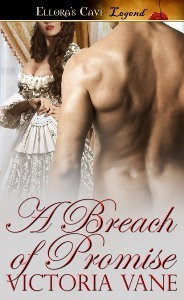Victoria Vane's Blog, page 22
March 8, 2012
Joyfully Reviewed Chats with Erotic Historical Author Victoria Vane
What is your most current work out?
A Breach of Promise from Ellora’s Cave
Tell us a little about A Breach of Promise.
It was while reading one of the most popular of late Georgian era plays, The Belle’s Stratagem, by Mrs. Hannah Cowley that I was inspired to write A Breach of Promise. While The Belle’s Stratagem juxtaposes two different story lines, the prevalent theme concerns men learning to respect the women in their lives before and after marriage. This is closely mirrored in my erotic historical novella, A Breach of Promise.
Like Cowley’s play, the premise of my story is an engagement contracted by the hero and heroine’s parents when they were very young. Also similar is that my own hero, Marcus, like Cowley’s Doricourt, has been many years travelling abroad and has recently returned to England a handsome, fashionable, and much sought after bachelor, but one who has learned to appreciate continental beauty and manners far above those of his own countrywomen.
When you start writing, do you already have the story plotted out or do you let the characters dictate what will happen?
I am not a plotter which tends to get me into some trouble at times! When I begin writing, I first have a “theme” in mind based on something I have come across in my research. I usually have a beginning and an end in mind but everything else is a blank page. When the characters come to me (usually one by one) they dictate what goes down on those empty pages. It’s actually a bit scary to not know what I’m writing ahead of time, but so far it’s worked for me!
What inspired you to write in your genre? Is this the genre you started writing in or have you morphed to this one?
I am a true-blue history buff and self-professed “Georgian Junkie” who loves nothing better than a well researched romantic story. I discovered early on in my writing that I have a particular talent for bringing my historical period to life through vivid and accurate detail in the dialogue, the dress, the characters’ mores, etc. Thus whatever I write (and I write across historical sub-genres from historical fiction as Emery Lee to erotic historical romance as Victoria Vane ) I will incorporate as much real detail such as people and events as will work for the given story. This is my passion and what I do best.
Do you have a favorite character you have written?
LINK TO FULL INTERVIEW:
http://www.joyfullyreviewed.com/inter...
Author Spotlight at Joyfully Reviewed
What is your most current work out? A Breach of Promise from Ellora’s Cave
Tell us a little about A Breach of Promise.
 It was while reading one of the most popular of late Georgian era plays, The Belle’s Stratagem, by Mrs. Hannah Cowley that I was inspired to write A Breach of Promise. While The Belle’s Stratagem juxtaposes two different story lines, the prevalent theme concerns men learning to respect the women in their lives before and after marriage. This is closely mirrored in my erotic historical novella, A Breach of Promise.
It was while reading one of the most popular of late Georgian era plays, The Belle’s Stratagem, by Mrs. Hannah Cowley that I was inspired to write A Breach of Promise. While The Belle’s Stratagem juxtaposes two different story lines, the prevalent theme concerns men learning to respect the women in their lives before and after marriage. This is closely mirrored in my erotic historical novella, A Breach of Promise.
Like Cowley’s play, the premise of my story is an engagement contracted by the hero and heroine’s parents when they were very young. Also similar is that my own hero, Marcus, like Cowley’s Doricourt, has been many years travelling abroad and has recently returned to England a handsome, fashionable, and much sought after bachelor, but one who has learned to appreciate continental beauty and manners far above those of his own countrywomen.
When you start writing, do you already have the story plotted out or do you let the characters dictate what will happen?
I am not a plotter which tends to get me into some trouble at times! When I begin writing, I first have a “theme” in mind based on something I have come across in my research. I usually have a beginning and an end in mind but everything else is a blank page. When the characters come to me (usually one by one) they dictate what goes down on those empty pages. It’s actually a bit scary to not know what I’m writing ahead of time, but so far it’s worked for me!
What inspired you to write in your genre? Is this the genre you started writing in or have you morphed to this one?
LINK TO FULL INTERVIEW http://www.joyfullyreviewed.com/interviews/author-spotlight-victoria-vane
Filed under: Uncategorized








February 16, 2012
THE IGNOMINIOUS WIFE SALE

Who’d be plagued with a wife
That could set himself free
With a rope or a knife
Or a good stick like me
DIVORCE IN THE GEORGIAN AGE
Until the Divorce Reform Act of 1857, the only legal grounds upon which a divorce suit could be filed were adultery (generally by the wife) or impotence on the part of the husband. In the prior case, a judgment of criminal conversation had to first be obtained and then the case would proceed to the Ecclesiastical courts for divortiom a mensa et thoro, or legal separation from bed and board but this prohibited remarriage. A complete severance of marital bonds could only be obtained by divortium a vinculo which required a third step, the complex and costly procedure of a private Act of Parliament. In sum, divorce was virtually impossible for the poorer members of society.
THE WIFE SALE
For the lower classes, desertion or elopement was a frequently employed alternative to divorce, whereby the wife was either forced out of the home, or the husband simply set up a new abode with his mistress. Another method was the wife sale. Commonly practiced from about the end of the 17th century, the custom of “Wife-selling” was a public ritual used by many to recognize the dissolution of a marriage amongst the classes for which a legal divorce was exceedingly cumbrous, prohibitively expensive, and completely impractical. It was also an inventive means of dealing with the end of marriage because it mixed punitive ritual and social regulation with public entertainment. The wife sale was described by a number of 18th and 19th century newspapers as incorporating the symbolism of a livestock auction with the woman being led to the marketplace in a halter followed by a public declaration by the husband.
The Laws Respecting Women, As They Regard Their Natural Rights (1777) observed that:
“for the poor, wife selling was viewed as a method of dissolving marriage when a husband and wife find themselves heartily tired of each other, and agree to part, if the man has a mind to authenticate the intended separation by making it a matter of public notoriety”.
Wife- Sale advertisement:
“To be sold for Five shillings, my wife, Jane Hebbard. She is stoutly built, stands firm on her posterns and is sound in wind and limb. She can sow and reap, hold a plough, and drive a team, and would answer any stout able man that can hold a tight rein, for she is damned hard-mouthed and headstrong; but if properly managed, would either lead or drive as tame as a rabbit. She now and then makes a false step. Her husband parts with her because she is too much for him. All her body clothes will be given with her”

Historical documents suggest certain requirement to be met for a wife-sale and “re-marriage” to be considered legitimate by the rural communities:
The woman had to wear a halter
The sale had to be a public event either at a market square or fair
The transaction had to have the semblance of an open auction
Some manner of payment was required in the exchange (often involving alcohol!)
An eye-witness to such an event in says:
“The man led a woman by a rope. “Come up,” he said, and the lady came up accordingly. She was encouraged to this promptly by the presence of a man behind her armed with a stick and prepared to support her husband’s action by appropriate arguments. The husband, it appears, was not unmindful of the well known precept that wives were more easily led than driven; but in case the one method failed he had provided for the enforcement of the other.”
For the husband, the sale released him from his marital duties, including any financial responsibility for his wife. For the purchaser, who was often the wife’s lover, the transaction freed him from the threat of a legal action for criminal conversation, a claim by the husband for restitution or damage to his property, in this case his wife.
Although some 19th-century wives objected, records of 18th-century women resisting their sales are non-existent. With no financial resources, and no skills on which to trade, for many women a sale was the only way out of an unhappy marriage. On occasion, the wife even insisted on the sale.
[image error]
A wife sold in Wenlock Market for 2s. 6d. in 1830 was quite determined that the transaction should go ahead, despite her husband’s last-minute misgivings:
“‘e [the husband] turned shy, and tried to get out of the business, but Mattie mad’ un stick to it. ‘Er flipt her apern in ‘er gude man’s face, and said, ‘Let be yer rogue. I wull be sold. I wants a change’.”
Primary Reference:
HUMOUR, HALTERS AND HUMILIATION: WIFE-SALE AS THEATRE AND SELF-DIVORCE BY Rachel Anne Vaesen, B.A., Simon Fraser University, 2003
Filed under: 18TH CENTURY CUSTOMS,MANNERS, ETIQUETTE, 18TH CENTURY HISTORY, 18TH CENTURY NEWS, CUSTOMS, MANNERS, ETIQUETTE, GEORGIAN ENGLAND








January 23, 2012
A WILD NIGHT'S BRIDE- coming soon from Breathless Press!
What happens when a struggling actress and a grieving widower come together in a night of unbridled debauchery orchestrated by a bored and machinating rake?
A WILD NIGHT’S BRIDE, a sexy, rollicking Georgian romp!
January 16, 2012
BIG NEWS!
More info and book cover to come soon....













